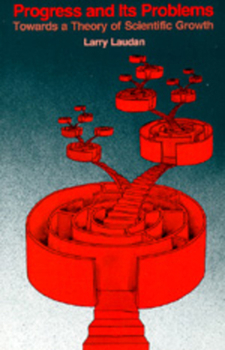Progress and Its Problems: Towards a Theory of Scientific Growth
Select Format
Select Condition 
Book Overview
"A book that shakes philosophy of science to its roots. Laudan both destroys and creates. With detailed, scathing criticisms, he attacks the 'pregnant confusions' in extant philosophies of science. The progress they espouse derives from strictly empirical criteria, he complains, and this clashes with historical evidence. Accordingly, Laudan constructs a remedy from historical examples that involves nothing less than the redefinition of scientific rationality and progress . . . Surprisingly, after this reshuffling, science still looks like a noble-and progressive-enterprise ... The glory of Laudan's system is that it preserves scientific rationality and progress in the presence of social influence. We can admit extra-scientific influences without lapsing into complete relativism. . . a must for both observers and practitioners of science." -- Physics Today "A critique and substantial revision of the historic theories of scientific rationality and progress (Popper, Kuhn, Lakatos, Feyerabend, etc.). Laudan focuses on contextual problem solving effectiveness (carefully defined) as a criterion for progress, and expands the notion of 'paradigm' to a 'research tradition, ' thus providing a meta-empirical basis for the commensurability of competing theories. From this perspective, Laudan suggests revised programs for history and philosophy of science, the history of ideas, and the sociology of science. A superb work, closely argued, clearly written, and extensively annotated, this book will become a widely required text in intermediate courses."-- Choice
Format:Paperback
Language:English
ISBN:0520037219
ISBN13:9780520037212
Release Date:October 1978
Publisher:University of California Press
Length:272 Pages
Weight:0.82 lbs.
Dimensions:0.7" x 6.0" x 8.9"
Customer Reviews
1 rating
A true classic in the history and philosophy of science
Published by Thriftbooks.com User , 26 years ago
Laudan's project in this book is to construct a normative model of scientific progress which is responsible to the historical facts, but does not lead to relativism. He argues against many contrary views by pointing to historical counterexamples. He constructs a model in which science is a highly rational enterprise, yet its rationality does not depend on the truthfulness of it's claims, but on its progressive ability to solve the problems it is confronted with. Thus his picture of science is a pragmatic one. As well as his positive model, the book has many excellent criticisms of reletivism and the 'strong program' in the sociology of knowledge. Laudan's biggest influences seem to me to be thinkers like Kuhn, Lakatos, and Feyerabend, but he is probably more traditionally 'rationalistic', and more historically knowledgable than any of them. His writing is very systematic, straight forward, and easy to read. He does not try to impress you by overwhelming you.





